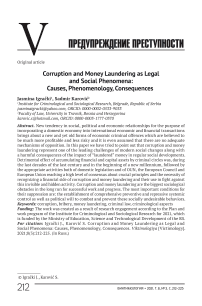Corruption and Money Laundering as Legal and Social Phenomena: Causes, Phenomenology, Consequences
Автор: Jasmina Igrački, Sadmir Karović
Журнал: Виктимология @victimologiy
Рубрика: Предупреждение преступности
Статья в выпуске: 3 т.8, 2021 года.
Бесплатный доступ
New tendency in social, political and economic relationships for the purpose of incorporating a domestic economy into international economic and financial transactions brings about a new and yet old forms of economic criminal offences which are believed to be much more profitable and less risky and it is even assumed that there are no adequate mechanisms of opposition. In this paper we have tried to point out that corruption and money laundering represent one of the leading challenges of modern social changes along with a harmful consequences of the impact of “laundered” money in regular social developments. Detrimental effect of accumulating financial and capital assets by criminal circles was, during the last decades of the last century and in the beginning of a new millennium, followed by the appropriate activities both of domestic legislation and of OUN, the European Council and European Union reaching a high level of consensus about crucial principles and the necessity of recognizing a financial side of corruption and money laundering and their use in fight against this invisible and hidden activity. Corruption and money laundering are the biggest sociological obstacles in the long run for successful work and progress. The most important conditions for their suppression are: the establishment of comprehensive preventive and repressive systemic control as well as political will to combat and prevent these socially undesirable behaviors
Corruption, bribery, money laundering, criminal law, criminological aspects
Короткий адрес: https://sciup.org/14120731
IDR: 14120731 | УДК: 343.9
Список литературы Corruption and Money Laundering as Legal and Social Phenomena: Causes, Phenomenology, Consequences
- Cvjetičanin D. Kríza zahraničného dlhu [External debt crisis]. Prizma, Belgrade; 2003. (in Serbian).
- Cuéllar M.F. The Tenuous Relationship Between the Fight Against Money Laundering and the Disruption of Criminal Finance. Journal of Criminal Law and Criminology. 2003;93:311, Stanford Public Law Working Paper No. 64. Available at: http://dx.doi.org/10.2139/ssrn.354740
- Dokic Z., Scekic A. Corruption as a severe form of crime. Proceedings of the XVI seminar of law “Serious forms of crime”, Budva; 2004 June 8-12; Institute for Criminological and Sociological Research and Higher School of Internal Affairs, Belgrade, 2004, p. 259-278.
- Golobinek R., Vujicic A., and others. Financial Investigations and Confiscation of Criminal Assets. — A Handbook for Police and Justice. Strasbourg: Council of Europe; 2006.
- Ilic G.P., Banovic B. International standards confiscation of criminally acquired property and domestic legislation. Pravna rijec. 2007;IV(12):299-317.
- Jordan D. Drug politics: dirty money and democracies. 1999. 296 p.
- McClean D.J. International Co-operation in Civil and Criminal Matters. Oxford: Oxford University Press; 2002.
- Karovic S., Simović M.M. Complexity of detection, investigation and proving of criminal offenses in the field of drug abuse. International scientific conference. Drugs and Drug Addiction: Legal, Criminological, Sociological and Medical issues. Belgrade (Serbia): Institute of Criminological and Sociological Research; 2020.
- Karovic S., Simovic M.M. Universal warranties of the suspect or accusedin criminal proceedings in Bosnia and Herzegovina. Archibald Reiss Days 2020. Belgrade (Serbia): University of Criminal Investigation and Police Studies; 2020.
- Lilley P. Dirty dealing: The untold truth about global money laundering, international crime and terrorism. London: Kogan Page Publishers; 2006.
- Mrvic-Petrovic N. Korupcija i strategija njenog suzbijanja [Corruption and strategy for counteracting corruption]. Ĉasopis Temida; 2001 br. 4. (in Hrvatski).
- Madzar, Lj. Political and economic roots of corruption. Proceedings System and Corruption. Belgrade: Center for Economic Research of the Institute of Social Sciences; 2000.
- Mesko G., Dobovsek B. Police prevention of corruption-analysis of manifestations of corruption and changes in the philosophy of the police organization. Proceedings Place and role of the police in crime prevention. Police Academy, Belgrade; 2000.
- Popović D. Winners and losers in transition. Politika, Ekonometar. 2003;(16).
- Popovic M. Ekonomska analiza korupcije [Economic analysis of corruption]. Bezbednost. 2003;45(3):353-374. (in Hrvatski).
- Schneider F., Windischbauer U. Money Laundering: Some Facts. Economics of Security Working Paper 25. Berlin: Economics of Security; 2010.
- Stojanovic, Z. Politika suzbijanja kriminaliteta [Crime prevention policy]. Novi Sad; 1991. (in Hrvatski).
- Tanzi V. Corruption Around the World: Causes, Consequences, Scope, and Cures. IMF Staff Papers. 1988;45(4): 559-594. https://www.imf.org/external/Pubs/FT/staffp/1998/12-98/pdf/tanzi.pdf
- Tanzi V., Schuknecht L. Public Spending in the 20th Century: A Global Perspective. Cambridge University Press; 2000. https://doi.org/10.5860/choice.38-1677
- Teofilovic, N., Jelačić, M. Sprečavanje, otkrivanje i dokazivanje krivičnih dela korupcije i pranja novca [Prevention, detection and proof of criminal acts of corruption and money laundering]. Belgrade: Police Academy; 2006. (in Hrvatski).
- Teofilovic N., Jelačić M. Some foreign policy aspects of corruption and money laundering. NBP. No. 1/2004, Belgrade: Police Academy; 2004. (in Hrvatski).
- Vesic D. Privatization process and level of corruption. Ekonomski vidici. 2004;9(3):469-475.
- Vukovic, S. Korupcija I vladavina prava [Corruption and the rule of law]. Belgrade: IDN — Draganic; 2003. (in Hrvatski).


